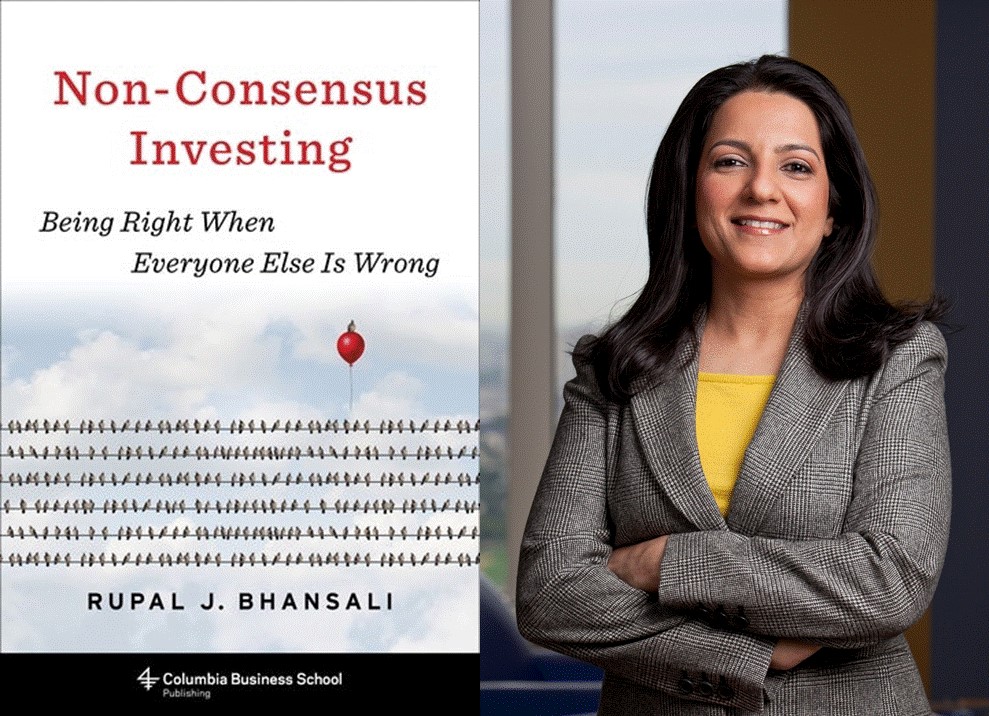Q&A: Rupal J. Bhansali on Non-Consensus Investing

“An instant classic! In this uniquely compelling book, Rupal J. Bhansali shows why active management is here to stay—and how active investors can still win at the investing game. A must read.”
~John Mihaljevic, Chairman, MOI Global
In Non-Consensus Investing: Being Right When Everyone Else Is Wrong, Rupal J. Bhansali takes a new approach to the “sport of investing,” making it a must read for anyone who seeks to understand why active investing disappointed and how it can succeed. In this Q&A, Bhansali discusses the inspiration for her book and the critical lessons readers will take away. Make sure to enter our drawing for a free copy of the book and to learn more about non-consesnus investing.
• • • • • •
Q: Why did you write the book?
Rupal J. Bhansali: According to many experts, we are likely to encounter a decade or so of low, no, or negative returns on investments. The need for higher returns and lower risk has never been greater, yet few asset classes or investment strategies offer either, let alone both. The solution is not to give up on these goals, but to change the means of achieving them. This book talks about those means: a game-changing investment discipline that I have honed and practiced over a career spanning twenty-five years, managing multi-billion-dollar global equity portfolios for sophisticated investors, ranging from pension plans to university endowments.
There is also a deeply personal reason to write this book. Throughout my life, I have been enlightened by other people’s wisdom or inspired by their points of view—often by reading their books. Books have been among my finest teachers, a way transcend time and space to learn from the best of the best. But if I only read and do not write, I feel I have taken but not given. Society and I owe a great debt to authors. If I can repay in some small measure to all those before me, I will feel my burden lightened.
Q: What is the core message of the book?
RJB: To achieve superior investment results versus peers and passive indexes, one must think and act differently from prevailing wisdom. The book reveals several counterintuitive precepts to succeed in the sport of investing—where the rules of the game are not only different, they are asymmetric! For example:
1. It is not enough to be correct; one must also be nonconsensus.
2. It is not enough to pick the winners; one must also know how to avoid the losers.
3. It is not about finding the right answers; but the right questions to ask.
4. It is not about winning the battle; but about winning the war.
5. It is not about settling for the suboptimal “Or” but insisting on “And.”
The book uses real-world case studies and stock examples from around the globe to bring these concepts to life.
Q: What is different about this book from other value investing books?
RJB: Most books on value investing focus overwhelmingly on what you pay, such as headline valuation multiples and past stock price action. I take a different approach and place primary emphasis on what you get—the future risk, returns, and growth of the business, not just what you pay for it.
Also, value investing has degenerated into valuation investing, but my emphasis is on investing with a margin of safety to reduce downside risk. I demonstrate how avoiding losers and losses matters more to compounding capital than simply picking the winners.
Finally, this book is a practical handbook on how to conduct differentiated fundamental research to connect the dots that others have not and identify mispriced securities.
Q: Anything else you would like to share about your book?
RJB: Yes! There is a chapter at the end called “A Special Message from Me to You” that I wrote especially for women. As one of the few solo female portfolio managers to manage a mutual fund in the United States, I wanted to share my story of how I broke through the glass ceiling and how others can follow in my footsteps to achieve similar success.
I fervently hope it encourages women to become more financially savvy let alone literate and to think of money as a thought-provoking instead of taboo topic. I would be thrilled to bits if this book motivates women to learn more about investing and consider a career in finance, as our gender is severely underrepresented in the profession.
If you enjoyed this post, remember to check back throughout the month for more guest blog posts from Columbia Business School Publishing authors and save 30% when you order this, or any other CBSP books, from our website by using coupon code: CUP30 at checkout.


